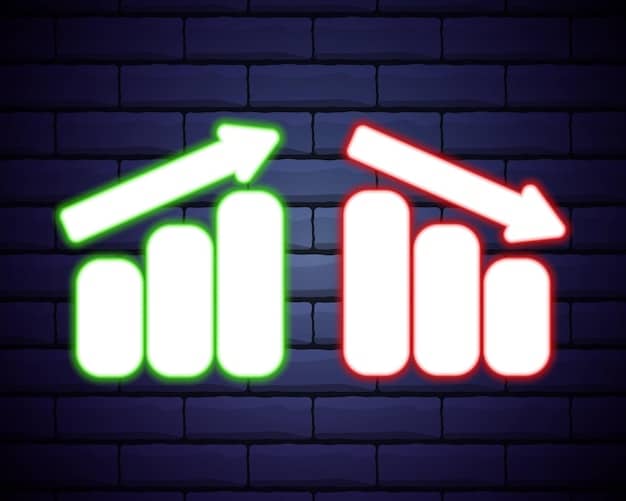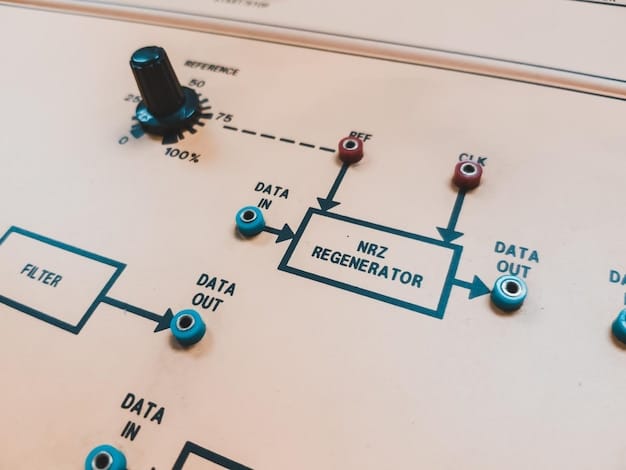AI-Powered Automated Marketing: Boost Lead Generation by 30% in the US

Automated marketing, driven by AI, empowers US businesses to streamline processes, personalize customer experiences, and significantly boost lead generation – potentially increasing it by 30%.
Is your US-based business struggling to generate enough leads? Automated marketing: How AI can boost lead generation by 30% for US businesses is no longer a futuristic concept but a present-day reality, offering a powerful solution to streamline processes, improve customer engagement, and ultimately, drive sales.
Understanding Automated Marketing and AI’s Role
Automated marketing involves using software and technologies to automate repetitive marketing tasks. AI enhances this automation by adding intelligence, allowing systems to learn, adapt, and make data-driven decisions.
This combination can revolutionize how US businesses attract, nurture, and convert leads.
The Basics of Marketing Automation
Marketing automation platforms handle tasks like email marketing, social media posting, and customer segmentation. This frees up marketing teams to focus on more strategic initiatives.
The Power of Artificial Intelligence in Marketing
AI algorithms analyze customer data to personalize marketing messages, predict customer behavior, and optimize marketing campaigns in real time.
- AI enables hyper-personalization of marketing content.
- Predictive analytics powered by AI can identify high-potential leads.
- AI-driven chatbots provide instant customer support and lead qualification.
By understanding the synergy between automation and AI, businesses can create more effective and efficient marketing strategies.
Benefits of AI-Powered Automated Marketing for US Businesses
Integrating AI into automated marketing offers numerous benefits for US businesses, leading to increased efficiency, improved customer experiences, and higher lead generation rates. Exploring these advantages can highlight the transformative potential of this integration.
From streamlined workflows to enhanced customer engagement, the advantages are significant.

Increased Lead Generation
AI algorithms can identify patterns and insights in customer data that humans might miss, leading to more targeted and effective lead generation campaigns. This results in a higher volume of qualified leads.
Enhanced Customer Experience
AI-powered personalization ensures that customers receive the right message at the right time, creating a more engaging and relevant experience. This increases customer satisfaction and loyalty.
- Automated email sequences nurture leads with relevant content.
- AI-driven chatbots provide instant answers to customer inquiries.
- Personalized website experiences cater to individual customer preferences.
Adopting AI-driven automated marketing offers a significant edge in today’s competitive landscape.
Key AI Technologies Used in Marketing Automation
Several AI technologies are instrumental in enhancing marketing automation. Understanding these technologies and their specific applications can help businesses make informed decisions about implementation.
From data analysis to content creation, these technologies are reshaping marketing practices.
Natural Language Processing (NLP)
NLP enables computers to understand and process human language, allowing for more effective chatbot interactions and sentiment analysis of customer feedback. This allows for better communication and understanding of customer needs.
Machine Learning (ML)
ML algorithms learn from data to improve predictions and decision-making. In marketing, ML can be used to optimize ad targeting, personalize content recommendations, and predict customer churn. This leads to more efficient and effective marketing campaigns.

These AI technologies are increasingly critical for businesses seeking to optimize their marketing efforts and drive growth.
Implementing AI-Powered Automated Marketing: A Step-by-Step Guide
Implementing AI-powered automated marketing requires careful planning and execution. Following a structured approach can help US businesses ensure a smooth and successful transition.
From setting clear goals to integrating the right technologies, each step is crucial.
Define Clear Objectives and KPIs
Start by identifying what you want to achieve with AI-powered automation. Set specific, measurable, achievable, relevant, and time-bound (SMART) goals.
Choose the Right Tools and Platforms
Select marketing automation platforms that offer robust AI capabilities and integrate seamlessly with your existing systems. Consider factors like ease of use, scalability, and vendor support.
- HubSpot offers AI-powered features for lead scoring and content optimization.
- Marketo provides AI-driven personalization and customer journey analytics.
- Salesforce Marketing Cloud includes AI-powered predictive intelligence.
A well-planned implementation strategy is essential for realizing the full potential of AI-powered automated marketing.
Overcoming Challenges in AI-Driven Marketing Automation
While AI-driven marketing automation offers significant benefits, businesses may encounter challenges during implementation. Addressing these challenges proactively can ensure a successful deployment.
From data privacy concerns to the need for skilled personnel, these obstacles must be managed effectively.
Data Privacy and Security
Ensure compliance with data privacy regulations like GDPR and CCPA. Implement robust security measures to protect customer data from breaches and unauthorized access.
Lack of Skilled Personnel
Invest in training programs to upskill your marketing team or hire professionals with expertise in AI and marketing automation. A skilled team is crucial for managing and optimizing AI-driven campaigns.
- Offer training workshops on AI and marketing automation tools.
- Partner with AI consulting firms for expert guidance and support.
- Recruit data scientists and AI specialists to build in-house expertise.
By addressing these challenges, businesses can unlock the full potential of AI-driven marketing automation and achieve sustainable growth.
The Future of Automated Marketing with AI in the US
The future of automated marketing in the US is inextricably linked to advancements in AI. As AI technology continues to evolve, we can expect even more sophisticated and personalized marketing strategies.
From predictive marketing to AI-driven content creation, the possibilities are vast.
Predictive Marketing
AI will enable marketers to anticipate customer needs and preferences with greater accuracy, allowing them to deliver highly targeted and relevant content. This will lead to increased engagement and conversion rates.
AI-Driven Content Creation
AI tools will assist in generating compelling marketing content, including blog posts, social media updates, and email campaigns. This will free up marketers to focus on more strategic tasks.
The integration of AI into automated marketing will continue to reshape the marketing landscape, creating new opportunities for businesses to connect with customers and drive growth.
| Key Point | Brief Description |
|---|---|
| 🚀 Boosted Lead Gen | AI enhances targeting for more effective lead generation. |
| 🤖 AI Personalization | Tailored experiences increase customer engagement and loyalty. |
| ⚙️ Automation Efficiency | Streamline repetitive tasks, freeing up marketing teams. |
| 🛡️ Data Security | Ensure compliance and protect customer data. |
FAQ
It involves using artificial intelligence to enhance marketing automation processes, enabling more personalized and efficient campaigns. AI helps in analyzing data and predicting customer behavior.
AI identifies patterns in customer data to target high-potential leads. Predictive analytics enables tailored content, increasing engagement and conversion rates effectively.
Key technologies include Natural Language Processing (NLP) for chatbots and sentiment analysis, and Machine Learning (ML) for predictive analytics and personalized recommendations.
Start by defining objectives and select suitable AI tools that integrate with your current systems. Train your team to manage and optimize AI-driven automated campaigns effectively.
Challenges include data privacy compliance, security concerns, and the need for skilled personnel. Proactive measures and investments are crucial to overcome these.
Conclusion
AI-powered automated marketing presents a significant opportunity for US businesses to enhance lead generation and customer engagement. By understanding the key technologies, implementing effective strategies, and addressing potential challenges, businesses can unlock the full potential of AI and drive sustainable growth in the competitive market.





